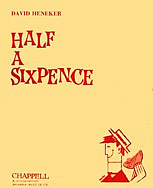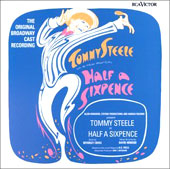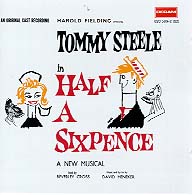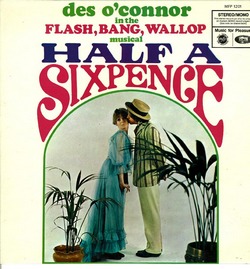Half a Sixpence

A musical comedy in 2 acts, 18 scenes: Book by Beverley Cross; based on the novel Kipps by H.G. Wells; Music & Lyrics by David Heneker
Cambridge Theatre, London - March 21, 1963 (677 perfs)
Broadhurst Theatre, New York - April 25, 1965 (512 perfs)
Synopsis
The play opens in Shalford's Drapery Emporium where Kipps works and lives as an apprentice draper. Ann, Kipps's childhood sweetheart, is in service so they don't get much chance to see each other. Kipps thinks that a lovers token might help the romance along but the next day brings news that is to change his life. He learns that solicitors are looking for him and consequently gets a little drunk. He is marched off to join his woodwork class run by Helen Walsingham. Kipps falls for her without much hope. Ann is cross with Kipps for not meeting her and walks out on him just before he learns that he has inherited a fortune. Spurred on by his new social standing Kipps proposes to Helen, but her family pressure makes him realise that Ann is his first and real love. Kipps and Ann marry but his yearning to maintain his social standing creates problems between them which are only resolved when a fortune is lost. A small fortune is offered to him ... he rejects it. "What a rum do everything is," he comments.
Story
Act I
Arthur Kipps is twenty years old and an apprentice in the Folkestone drapery of Mr Edwin Shalford. It is hard work, seven to seven, and strict discipline, bed at 930 and on line for work first thing, and woe betide if Shalford's motto of `Fishency, System, Economy' isn't the watchword of every day. Particularly economy. Kipps and his fellow apprentices resent their fife with the healthy resentment of youth, but only Sid Pornick who has taken up with Socialism has made any practical step towards fighting the system. When Sid tries to get the others to join him at a Fabian meeting, they squirm out their excuses—girls, sore feet, or, in Kipps' case, a meeting with Sid's sister Ann who's in domestic service down the road. He can't talk to girls, but Ann he's known since they were kids so that's different.
Ann has a smart head and a tart tongue to put her brother's fancy ideas firmly in their place, and she also has a soft spot for the awkward Artie Kipps. She won't let him kiss her, kissing's soft, but she doesn't mind saying she'll be his girl and taking the half-sixpence he offers her as a lover's token. Artie's next meeting with Ann goes out the window when his employer volunteers him as a student at the Young Persons Association, an institution for keeping working class youth off the street by teaching them useful occupations, in which the Walsingham family, good customers at Shalford's emporium, are interested. But that evening, while the glum Artie is on his way to his unwanted class, he is the victim of a little accident, run down by an out-of-control cyclist.
 The cyclist in question is Mr Chitterlow, an actor and playwright of a flamboyant turn and the possessor of a coincidence. When Kipps introduces himself, Chitterlow performs a double-take. He has seen the boy's name in the daily newspaper one of those delightful advertisements that end 'may hear something to his advantage'. Chitterlow hurries his new friend off to a public house to celebrate his imminent good fortune and, while Chitterlow bonhomously spreads the news, Artie celebrates whatever it is that's coming to him with his first alcoholic drink and a rousing chorus song. The merry-making spills into the street and Kipps is spied by Shalford, disentangled from a lamppost and, expectations or no expectations, frog-marched off to the Young Persons Association.
The cyclist in question is Mr Chitterlow, an actor and playwright of a flamboyant turn and the possessor of a coincidence. When Kipps introduces himself, Chitterlow performs a double-take. He has seen the boy's name in the daily newspaper one of those delightful advertisements that end 'may hear something to his advantage'. Chitterlow hurries his new friend off to a public house to celebrate his imminent good fortune and, while Chitterlow bonhomously spreads the news, Artie celebrates whatever it is that's coming to him with his first alcoholic drink and a rousing chorus song. The merry-making spills into the street and Kipps is spied by Shalford, disentangled from a lamppost and, expectations or no expectations, frog-marched off to the Young Persons Association.
The class at the Association is taken by Miss Helen Walsingham, recently of London University and devoted to good works. Unfortunately, Artie is a little the worse for drink and, instead of woodworking, succeeds in putting his hand through a glass panel. Helen tends his cut wrist and the boy is dazzled by her attentions.
The next morning Ann calls at the emporium to find out why Kipps stood her up the previous night and the shop girls take delight in making the worst out of the events. Ann snaps back at them in his defence, but when Kipps appears she smacks his face and storms out. But better is in store for Artie. Chitterlow arrives with good news: it really is a fortune, Kipps has inherited an income of £1200 a year At that Kipps passes out, but he's himself again by the time Shalford comes in to give him the sack. With all the hauteur of the newly rich, Kipps resigns in an irrevocable fashion and the boys and girls join together to sing of his future.
The new gentleman runs into the Walsinghams who are now decidedly keen to know him. Helen invites him to dinner, the son offers his services as a business adviser, and Mrs Walsingham exudes charm instead of condescension. As they leave, Kipps looks after Helen and dreams. She isn't, of course. She's a nice enough example of genteel, impoverished, seaside society whose university education has only served to make her less than content with life in Folkestone. She's not at all averse to the bright, well-off Artie. She invites him to join her at the forthcoming regatta and Artie is in seventh heaven.
At the regatta on 'The Old Military Canal' Artie asks Helen to marry him and she accepts. She will make a gentleman of him. Young Walsingham calls for the champagne Artie has ordered at his suggestion, and the maid brings the bottle. It is Ann. When she hears from Artie's own lips that he has asked Helen to marry him, she flings the tray to the floor and pulling up her skirt takes the half-sixpence from her bloomers. Hurling it back at him she rushes out. Artie goes to follow her, but Helen puts out her arm and he turns back again as the rain pours down on their celebration.
Act 2
Artie is forlorn and he doesn't heed Chitterlow who attempts to put woman trouble in its unimportant place in the scheme of things as Artie moons sadly over his loss. When it comes to the point, however, he goes back to the Walsinghams. In spite of his efforts and Helen's determined patience, he fits ill in such society and at Mrs Botting's Solarium Dance he commits further solecisms. Under constant criticism from the Walsinghams, he bites back his natural retorts and keeps on trying to be 'proper', but when he hears of the punishments that Ann has been subjected to following the incident at the regatta it is too much for him. He bursts out fulsomely against Mrs Boiling and refuses to apologise.
 When Helen and the other Walsinghams take Mrs Botting's part, he bundles them all together on the receiving end of an angry speech and ends up by calling the wedding off and running away down to the basement kitchen to find Ann. He's been a fool. She's his girl and she must come away and marry him. Ann is not keen on upsetting the order of things but, now that they've finally got round to talking on such a subject, she does love him.
When Helen and the other Walsinghams take Mrs Botting's part, he bundles them all together on the receiving end of an angry speech and ends up by calling the wedding off and running away down to the basement kitchen to find Ann. He's been a fool. She's his girl and she must come away and marry him. Ann is not keen on upsetting the order of things but, now that they've finally got round to talking on such a subject, she does love him.
So Artie and Ann are married at a lively ceremony captured in a comical set of photographs. Married life begins in a rented house with Kipps still trying to be a gentleman and Ann not at all keen on having to have a maid when she'd rather do the work herself. When she answers the door to callers in her working clothes, Kipps 'gets angry and she can only answer,.
Kipps is building a big house for them to live in When they quarrel he looks at the place where it will be, and dreams, not hearing Ann singing in counterpoint. But Kipps' plans are not going to come true. While he was still courting Helen, he gave all his money into the hands of young Walsingham as his financial manager, and Walsingham has played the market and lost every penny. Now Artie is more or less back where he started, but not quite. He sells up everything that is left, including the land where the big house was to have been, and they put together enough money to rent a little bookshop. There they live modestly and happily ever after... until one day Chitterlow turns up again.
Once upon a time, back in the rich days, Kipps had given his friend £200 for a quarter share in a play, hoping to help the great unproduced to finally make it to the stage. Now Chitterlow has made a hit. There will be money, oodles of it for them all. But Artie Kipps and his missis have been there before. The money may come or it may not; they are happy in their way of life and that's the way they will stay. As their friends go out to celebrate Chitterlow's good fortune, the Kipps family stay happily by their Christmas fire.
Casting:
23 parts, 13 principals.
- Arthur Kipps, winning actor who can sing, dance, and play the banjo (latter can be faked). *
- Sid, Buggins, and Pearce, Kipps's singing and dancing buddies. *
- Ann, Kipps's true love, legit voice. *
- Helen, Kipps's other love, straight role, minor singing. *
- Flo Bates
- Mr Shalford
- Mrs Walsingham
- Chitterlow
- Young Walsingham
- Victoria
- Kate
- Emma
- Mrs Boating
- Laura, Gwendolin
- Lady Student
- Carshott
- Chester Coote
- Photographer
- Mr Wilkins,
- etc.
* Major Singing Roles: Others are straight roles with minor singing and dancing. Large singing and dancing chorus. Almost everyone dances at least a little.
Total cast, 34-46.
Musical Numbers
Act I
- Economy - Kipps and apprentices
- Half a Sixpence - Kipps and Ann
- Money To Burn - Kipps and men's chorus
- I Don't Believe A Word Of It - Ann and Shopgirls
- A Proper Gentleman - Kipps and chorus
- She's Too Far Above Me - Kipps
- If The Rain's Got To Fall - Kipps and Chorus
- The Old Military Canal - Chorus
- Act I Finale
Act II
- The One Who's Run Away - Kipps and Chitterlow
- Long Ago - Ann and Kipps
- Flash, Bang, Wallop! - Kipps and ensemble
- I Know What I Am - Ann
- The Party's On The House - Kipps and Ensemble
- Half a Sixpence - Reprise - Kipps and Ann
- Finale
Scenes and Settings
2 acts, 18 scenes, 9 full stage sets (including 3 drops), 4 scene drops. The original production used 1 large turntable.
ACT I
- Scene 1: The Emporium.
- Scene 2: The Promenade.
- Scene 3: The Emporium.
- Scene 4: "Hope and Anchor" Bar.
- Scene 5: The Street.
- Scene 6: The Classroom.
- Scene 7: The Emporium.
- Scene 8: The Promenade.
- Scene 9: The Old Lighthouse.
- Scene 10: Military Canal Regatta.
ACT II
- Scene 1: Mrs. Botting's Solarium.
- Scene 2: Kitchen.
Scene 3: Photographer's Studio. - Scene 4: Parlor of Rented House.
- Scene 5: The Pier.
- Scene 6: The Building Site.
- Scene 7: The Promenade.
- Scene 8: The Bookshop.
Instrumentation
Violins I–II, cello, bass, reed I, II, III, IV, trumpet I, II, III, trombone I, II, guitar-banjo, percussion, piano-conductor.
Period and Costumes
Folkestone, England, 1900: apprentice clothes, blazers, white pants, straw hats, morning suits, bowlers, black dresses with white trimming, society gowns and day dresses of the period, sailor dresses, maids' uniforms, knickerbockers, male evening clothes, barmaid, rough-looking costumes for bar patrons, wool caps, mufflers.
Choreography
Opening ballet: a day's business at the Emporium; soft shoe, modern, promenade, couples number, tableau, modern, photograph number.
Lighting and Special Effects
Some dramatic and special lighting (day and night). Lamps on set, independent lighting on canal barge, party lighting.